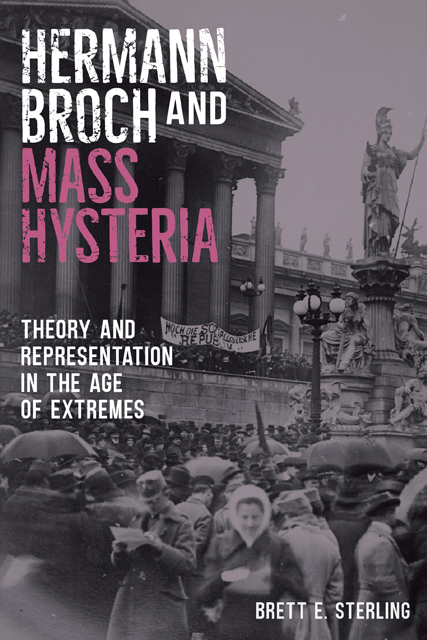Book contents
- Frontmatter
- Dedication
- Contents
- Acknowledgments
- List of Abbreviations
- Introduction
- 1: First Encounters, 1918–1929
- 2: The Power of Literature
- 3: The Mass Takes Shape: Literary Representations
- 4: Theory and Its Discontents: The Massenwahntheorie
- 5: The Threshold of Experience: Die Verzauberung
- Conclusion
- Bibliography
- Index
2: - The Power of Literature
Published online by Cambridge University Press: 11 January 2023
- Frontmatter
- Dedication
- Contents
- Acknowledgments
- List of Abbreviations
- Introduction
- 1: First Encounters, 1918–1929
- 2: The Power of Literature
- 3: The Mass Takes Shape: Literary Representations
- 4: Theory and Its Discontents: The Massenwahntheorie
- 5: The Threshold of Experience: Die Verzauberung
- Conclusion
- Bibliography
- Index
Summary
Broch’s turn to literature was not immediately predictable from his life and career prior to the late 1920s. His motivations were a complex combination of psychological, philosophical, and economic considerations involving his dissolving marriage and his dissatisfaction with the constraints of business, as well as his engagement with philosophical theories of the day. For my purposes here, the philosophical roots of Broch’s emerging literary ambitions are of central importance. Disillusioned with the direction of contemporary philosophy in the form of logical positivism, he developed an elaborate theory that set literature above and beyond philosophy and science as a means of attaining knowledge about the world. The purpose of this chapter is to examine why Broch considered literature the appropriate choice for this task and how literature is able to access, create, and disseminate knowledge. Examining this theory will enable us to question how literature can provide an alternative to theoretical writing when it comes to accessing a concept like the mass, which defies depiction and understanding.
The starting point for a discussion of Broch’s literary theory is partially biographical. A child of his time, Broch witnessed the mass destruction of the First World War, the fall of the Austro-Hungarian Empire, and a succession of crises in the European worldview, from the destabilization of the self as revealed by psychoanalysis to the reconceptualization of matter, time, and the universe necessitated by quantum mechanics and general relativity. As Western culture was rocked by these successive reevaluations of beliefs about the world long held to be infallible and essential to the understanding of nature, people understandably looked for new facts and institutions to provide them with stability, lest they lose themselves completely in a world revealed to be chaotic, unpredictable, and unknowable to its core.
Broch had watched these myriad crises arise and unfold during his formative years from the turn of the century into the 1920s. Unfulfilled in his personal life as an industrialist, he sought a way to give his activities greater purpose, namely by dedicating himself to acquiring knowledge about, and increasing his understanding of the world.
- Type
- Chapter
- Information
- Hermann Broch and Mass HysteriaTheory and Representation in the Age of Extremes, pp. 44 - 74Publisher: Boydell & BrewerPrint publication year: 2022



